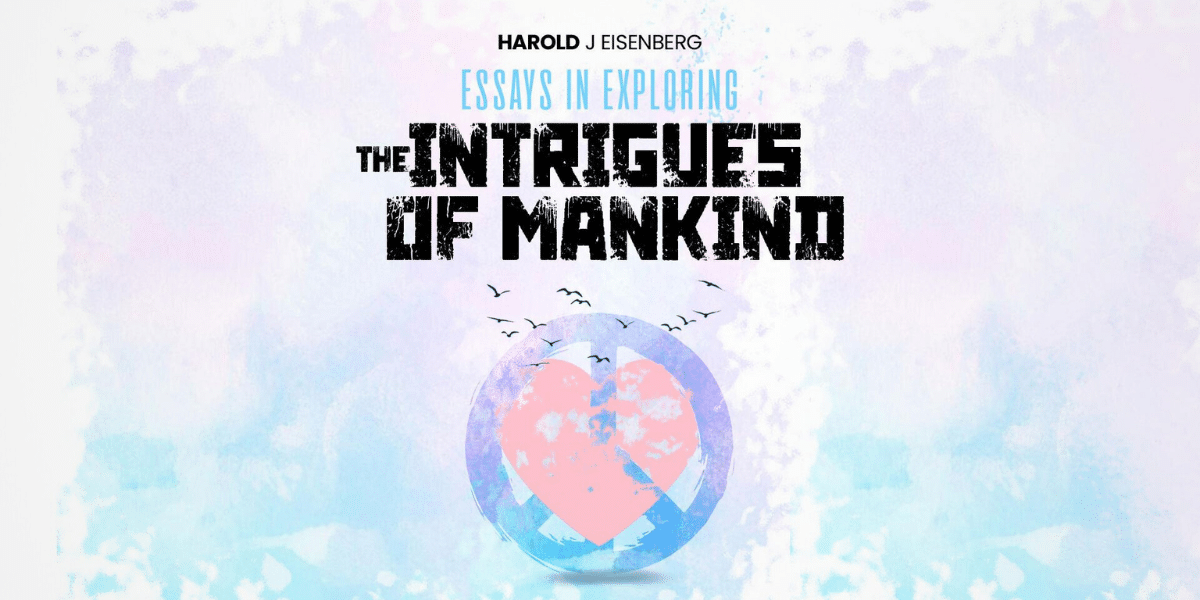In a world where the complexities of human nature are often overlooked, some authors emerge as significant voices, combining personal experiences with intellectual understanding. Such authors use their experiences, literary aspirations, spiritual meditation, and other elements to analyze human nature. Veteran, philosopher, and prolific author Harold J. Eisenberg is one such literary voice. In his book Essays In Exploring The Intrigues Of Mankind In Enlightening His Mind And Soul, Eisenberg asks readers to consider essential concerns about morality, fairness, and the human spirit.
His writings represent a deep understanding of the human condition gained from years of diverse experiences, not merely the thoughts of a man who has seen much. Eisenberg’s life of discipline, strife, and study illuminates humanity’s challenges, aspirations, and moral problems. This life convergence led to his landmark book, Essays In Exploring The Intrigues Of Mankind In Enlightening His Mind And Soul, which explores humanity’s constant search for enlightenment, fairness, and peace.
Harold Eisenberg grew up in Cleveland, Ohio, among diversity. In a time of stark racial divisions, Eisenberg learned inclusion and empathy in a mainly black neighborhood. His background instilled a strong sense of fairness and justice, which shaped his work. His lifelong interest in equality and human harmony sprang from these early experiences.
Starting in Cleveland and continuing at USC, Eisenberg acquired a pharmacy and psychology education. His Air Force service shaped his character, and he learned about human complexity through military discipline and life’s realities. He was moved to write about inequity and the human spirit’s endurance after seeing racial segregation in the military. Eisenberg’s Air Force experiences were crucial in his life and his writings. He has seen the finest and worst people due to the military’s organization and fighting. Eisenberg saw the harm of prejudice, which shaped his social justice work. These views led to numerous stunning articles on humanity’s darker impulses toward hate and separation.
One of Eisenberg’s most moving articles, “The Absurdity of War,” examines war’s futility and the human cost. Using his military experience, he passionately criticizes billions spent on destruction while millions suffer in poverty. Eisenberg questions how humanity justifies violence while ignoring its genuine needs, expressing his views on the futility of war.
After serving in the military, Eisenberg sought peace in geopolitics and the spirit. His writings always debate good and evil. In “The Curse of Slavery,” Eisenberg considers slavery a historical catastrophe and a lasting stain on society. His depiction of slavery as a representation of humanity’s inability to acknowledge everyone’s value resonates with his military duty experiences with racism.
“Nature’s Symphony” is another prominent work, and this article by Eisenberg contrasts humanity’s destruction of nature’s beauty with his intellectual reflections. Eisenberg uses rich depictions of animals and natural settings to symbolize harmony, which humans’ conflicts and prejudices disturb. The article encourages readers to reconnect with nature and appreciate its equilibrium.
In “The Balance of Humanity, Science, and God,” Eisenberg balances science and religion. He respects scientific advances, especially in medicine and astronomy, while acknowledging a higher power’s involvement in the universe’s creation. In this article, he discusses how we must balance rationality with religion, science, and spirituality to understand the universe and ourselves.
Harold J. Eisenberg’s Essays In Exploring The Intrigues Of Mankind In Enlightening His Mind And Soul wants to inspire action, not merely think about good and evil. Eisenberg’s works encourage readers to face human problems. His literature explores the eternal conflict between virtue and sin and the fight for justice in an unjust world. Eisenberg sees life’s complexities as a call to knowledge, responsibility, and moral bravery, not academic curiosity. In works like A Little More Love, Eisenberg urges readers to embrace compassion as the ultimate change agent. His words remind us that love heals the world, even when violence and hate are loud.
His article Education Yields Good Reason shows his optimism. Eisenberg addresses how education broadens brains and encourages critical thinking, preparing future generations to face challenges with wisdom and insight. He believes education is the ultimate equalizer, allowing individuals from all backgrounds to contribute meaningfully. Eisenberg believes raising educated, moral children is the best way to secure a better, more egalitarian future.
Eisenberg’s philosophy is rooted in ancient and contemporary ideas. His appreciation of ancient history, especially Greek and Roman culture, shapes his views on justice, wisdom, and humanity. His article Good Who Inherit The Earth! shows how ancient knowledge still shapes morality and leadership today.
His faith also influences Eisenberg’s work in God and Jesus Christ. Beyond dogma, his spiritual musings are personal observations of life’s meaning and purpose. In a world of uncertainty and doubt, his articles encourage readers to reflect on their spiritual journeys and seek truth and enlightenment.
A Prayer of Devotion, The Fall of Man, and The Consequence of Sin use biblical themes to examine humanity’s spiritual fights with good and evil. Eisenberg believes religion is a living force that influences our behaviors and choices.
In articles like The Absurdity of War and The Curse of Slavery, Eisenberg explores the terrible truths of human life, encouraging readers to wrestle with the complexity. Reading his work allows people to benefit from his accomplishments and failures after a lifetime of reflection and experience.
Harold J. Eisenberg’s Essays on Exploring the Intrigues of Mankind in Enlightening His Mind and Soul explores humanity’s most fundamental problems. Eisenberg’s writing on conflict, justice, love, and religion allows readers to explore the depths of human experience. His art reflects his life and guides others on moral and spiritual paths.
Published by: Khy Talara


















